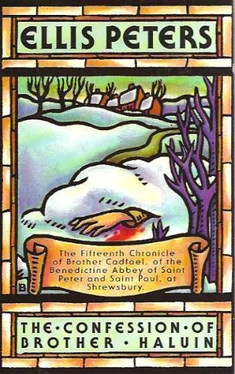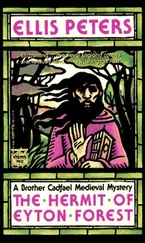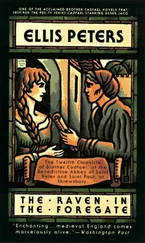In the morning, after Prime, their farewells made, they set out on the long journey home.
The sisters were in chapter when Cadfael and Haluin took scrip and crutches and went out from the guest hall, but the girl Helisende went with them to the gate. It seemed to Cadfael that all these faces about him had been washed clear of every shadow and every doubt; they had all of them that stunned brightness, astonished by the good that had befallen them. Now it could be seen more clearly how like were father and daughter, so many of the marks of the years having been smoothed from Haluin’s face.
Helisende embraced him without words at parting, fervent but shy. However they had spent the previous day, whatever confidences had been exchanged, she could not so quickly know him of her own knowledge, only through her mother’s eyes, but she knew of him that he was gentle and of pleasing person and address, and that his eruption into her life had freed her from a nightmare of guilt and loss, and she would always remember and think of him so, with pleasure and gratitude not so far distant from love. Profit enough, even if he never saw her again.
“God keep you, Father!” said Helisende.
It was the first and the last time that she gave him that title not as a priest but as a man, but it was a gift that would last him a lifetime.
They halted for the night at Hargedon, where the canons of Hampton had a grange, in a countryside slowly being recovered out of the waste that had followed the Norman settlement. Only now, after sixty years, was ploughland being resurrected out of the scrub, and an occasional hamlet being raised where tracks crossed, or rivers provided water for a mill. The comparative security offered by the presence of the canons’ steward and servants had drawn others to settle close by, and there were now assarts being hewn out of the neglected woods by enterprising younger sons. But still it was sparsely populated territory, level, lonely, and in the evening light melancholy. Yet with every labored step taken westward across this mournful plain Brother Haluin’s brightness increased, his pace quickened, and his color flushed into eagerness.
From the narrow unshuttered window in the loft he looked out westward into a night full of stars. Nearer to Shrewsbury, where the hills began to heave their fleeces towards the mountains of Wales, earth and sky balanced in harmony, but here the vault above looked immense, and the earth of men suppressed and shadowy. The brilliance of the stars, the blackness of the space between, spoke of a touch of frost in the air, but promised a fine day for the morrow.
“And you never feel,” said Cadfael quietly, “any desire to look back over your shoulder?”
“No,” said Haluin tranquilly. “No need. There behind me all is well. All is very well. There is nothing now for me to do there, everything where I am bound. We are sister and brother now. We ask nothing more, we want nothing more. Now I can bring a whole heart to God. I’m glad beyond measure that he cast me down, to raise me renewed to his service.”
There was a long, untroubled silence, while he continued to stare out into the clear night with a kind of bright hunger in his face. “I left a leaf half finished when we set out for Hales,” he said meditatively. “I thought to be back to complete it long before this. I hope Anselm has not given it to someone else. It was a capital N for the Nunc Dimittis, still wanting half of the colors.”
“It will be waiting for you,” Cadfael assured him.
“Aelfric is good, but he doesn’t know my intent, he might overdo the gold.” His voice was soft and practical and young.
“Leave fretting,” said Cadfael. “Possess your soul three days more in patience, and you’ll have brush and pen in hand again, and get back to work. And so must I to my herbs, for the medicine cupboards will be running low by this time. Lie down, lad, and get your rest. There are more miles waiting for you tomorrow.”
A soft wind from the west blew in through the open window, and Haluin lifted his head and sniffed the air like a high-bred horse scenting his stable.
“How good it is,” he said, “to be going home!”












